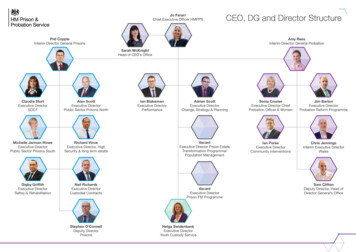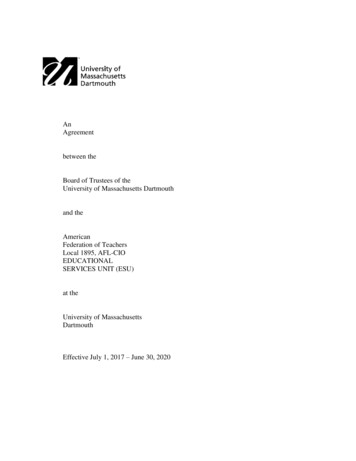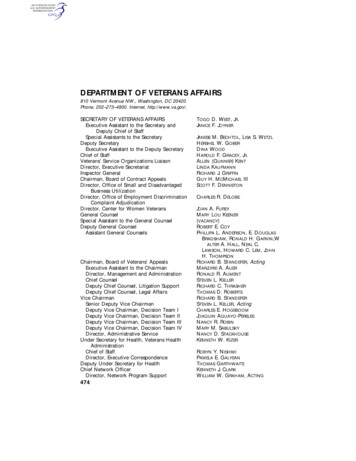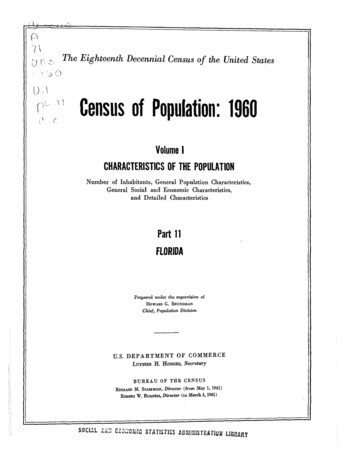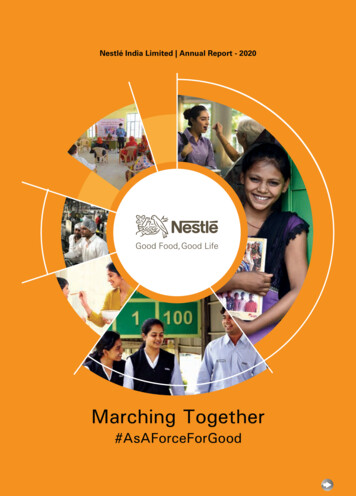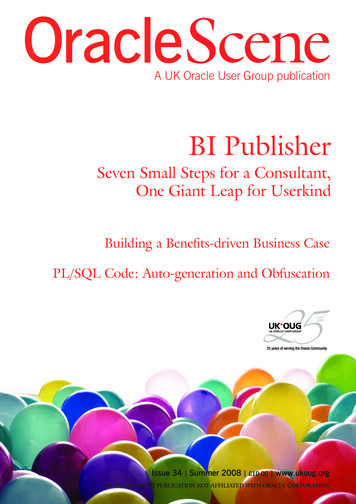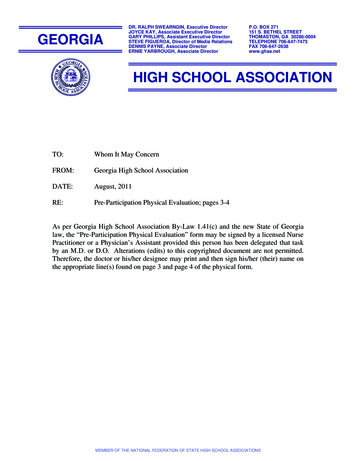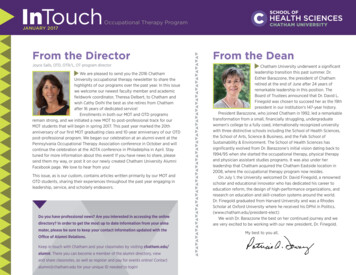
Transcription
InTouchOccupational Therapy ProgramJANUARY 2017From the DirectorFrom the DeanJoyce Salls, OTD, OTR/L, OT program directorChatham University underwent a significantleadership transition this past summer. Dr.Esther Barazzone, the president of Chathamretired at the end of June after 24 years ofremarkable leadership in this position. TheBoard of Trustees announced that Dr. David L.Finegold was chosen to succeed her as the 19thpresident in our institution’s 147-year history.President Barazzone, who joined Chatham in 1992, led a remarkabletransformation from a small, financially struggling, undergraduatewomen’s college to a fully coed, internationally recognized universitywith three distinctive schools including the School of Health Sciences,the School of Arts, Science & Business, and the Falk School ofSustainability & Environment. The School of Health Sciences hassignificantly evolved from Dr. Barazzone’s initial vision dating back to1994/95 when she started the occupational therapy, physical therapyand physician assistant studies programs. It was also under herleadership that Chatham acquired the Chatham Eastside location in2008, where the occupational therapy program now resides.On July 1, the University welcomed Dr. David Finegold, a renownedscholar and educational innovator who has dedicated his career toeducation reform, the design of high-performance organizations, andresearch on education and skill-creation systems around the world.Dr. Finegold graduated from Harvard University and was a RhodesScholar at Oxford University where he received his DPhil in Politics.(www.chatham.edu/president-elect)We wish Dr. Barazzone the best on her continued journey and weare very excited to be working with our new president, Dr. Finegold.We are pleased to send you the 2016 ChathamUniversity occupational therapy newsletter to share thehighlights of our programs over the past year. In this issuewe welcome our newest faculty member and academicfieldwork coordinator, Theresa Delbert, to Chatham andwish Cathy Dolhi the best as she retires from Chathamafter 16 years of dedicated service!Enrollments in both our MOT and OTD programsremain strong, and we initiated a new MOT to post-professional track for ourMOT students that will begin in spring 2017. This past year marked the 20thanniversary of our first MOT graduating class and 10-year anniversary of our OTDpost-professional program. We began our celebration at an alumni event at thePennsylvania Occupational Therapy Association conference in October and willcontinue the celebration at the AOTA conference in Philadelphia in April. Staytuned for more information about this event! If you have news to share, pleasesend them my way, or post it on our newly created Chatham University AlumniFacebook page. We love to hear from you!This issue, as is our custom, contains articles written primarily by our MOT andOTD students, sharing their experiences throughout the past year engaging inleadership, service, and scholarly endeavors.Do you have professional news? Are you interested in accessing the onlinedirectory? In order to get the most up to date information from your almamater, please be sure to keep your contact information updated with theOffice of Alumni Relations.Keep in touch with Chatham and your classmates by visiting chatham.edu/alumni. There you can become a member of the alumni directory, viewand share classnotes, as well as register and pay for events online! Contactalumni@chatham.edu for your unique ID needed to login!My best to you all,
Welcomes and Farewells We are delighted to welcome our newest facultymember, Theresa Delbert, MS, OTR/L to ChathamUniversity! Theresa joined Chatham part-time as assistantprofessor and part-time academic fieldwork coordinatorin January 2016 and became our full time academicfieldwork coordinator in January 2017 as Dr. CathyDolhi retired. Theresa received both her Bachelor ofScience in Therapeutic Studies and Master of Science inOccupational Therapy from Boston University. Her clinical background includesworking with both children and adults in a variety of practice settings includingacute care, rehabilitation, long-term care, home care, early intervention,outpatient and school based. Clinical areas of interest include spinal cord injuriesand occupation based practice. Theresa is looking forward to working withstudents and building connections with fieldwork sites in the community.We bid farewell to Dr. Cathy Dolhi this year after 16years of dedicated service to the Chatham Master ofOccupational Therapy program, including eight years asacademic fieldwork coordinator. Cathy is an outstandingeducator, leader, mentor, and accomplished scholarand will be missed by all. She has guided hundreds ofstudents through the program and fieldwork, and isknown for her ability to engage students in almost anytopic through active learning and the use of humor. We are grateful for hermultiple contributions to the Chatham program and wish her the best as sheventures into her new chosen “occupations” in retirement!ALUMNI SPOTLIGHTElizabeth Sherman, MOT ’16, OTR/LElizabeth Sherman, MOT 2016, set some leadership goals for herself in herlast academic term at Chatham. One of her goals was to present at a peerreviewed conference on a topic she waspassionate about: trauma sensitive yoga.One year later, Elizabeth presented a3-hour workshop at the PennsylvaniaOccupational Therapy conference inLancaster PA entitled “Trauma SensitiveYoga: What is Occupational Therapy’sRole?” and received very positive feedbackfrom the participants! This experiencefurther sparked her interest in continuingscholarly work, and she has applied to be aTEDGlobal 2017 Fellow and present at theTED conference this coming year. Elizabethwas also invited back to Chatham this pastfall as a guest speaker and presented on the topic of trauma sensitive yoga in ourMental Health and Occupational Performance class.Elizabeth is currently employed as an occupational therapist at the TALKInstitute and School in Newtown Square, Pennsylvania, a parent-foundedprogram and Pennsylvania’s only full-day, intensive, fully integrated therapeuticand academic day school for students with autism and other severe speech/language disorders. She continues to bring her knowledge and passion for yogato her work as a clinician, implementing a yoga program for children at herworksite.Elizabeth reports that the Chatham University curriculum prepared her well forthis new position. She states, “I am forever grateful for my graduate experience atChatham in preparing me to provide true holistic OT treatment for my students.Chatham’s program provides a multitude of experiential learning opportunitiesto stress the importance of recognizing the connection between mental andemotional health with physical well-being. I wake up each day and do work Iabsolutely love thanks to the support of Chatham’s MOT program.”
MOT STUDENT EXPERIENCEWest Penn Burn Camp: The Sky’s the LimitSam Bauer, OTS; Megan Dominik, OTS; Emily Gregory, OTS; Sam Wannstedt, OTSOver the summer, several students from Chatham University’s Master ofOccupational Therapy (MOT) program volunteered at West Penn Hospital’sAnnual Burn Camp. Chatham’s connection with this volunteer opportunity stemsfrom its affiliation with West Penn Hospital via community and educationalinvolvement. The camp is a five-day retreat for children ages 7-17 who havesustained serious burns and received treatment at UPMC Mercy and West PennHospital’s burn centers. Since the beginning of this camp in 1986, it has beenserving individuals who have experienced a burn and endured the challengingrecovery process. The camp experience is free to all participants thanks todonations from supporting individuals and businesses.Burn Camp provides an opportunity for kids to openly express their emotionsthrough bonding and interacting with peers who have had similar experiences.The open atmosphere creates a support system for all the children to share,listen, and have fun with each other while engaging in various adventurousactivities throughout the week. Additionally, because this camp is specializedand staffed by professionals, it gives parents comfort in knowing that they aresending their kids to a safe and fun place. Through these shared experiences, thechildren are able to improve their self-esteem and create lasting friendships.The theme of this year’s camp was “The Sky’s the Limit,” which promoted apositive atmosphere for the children to set goals beyond their comfort zones.The camp took place June 4-8. Camp locations consisted of various sites such asKennywood Park, Camp Kon-O-Kwee in Butler County, and the Carnegie ScienceCenter in Pittsburgh.Chatham MOT students took part in Kennywood Park and Camp Kon-O-Kweeday. At Kennywood, volunteers monitored the children, socialized, and went onrides with them. The volunteers at Camp Kon-O-Kwee assisted in coordinatingoutdoor games and activities and playing with the children. The outdooractivities consisted of a multi faceted relay race involving problem solving,collaboration, and peer support. The campers also learned about fire safety andengaged playfully with the firefighters from the local fire department. Campconcluded with a hot air balloon ride, which tied into this year’s theme. Theactivities encouraged team bonding and socialization amongst the campers.Through this experience, Chatham students were able to demonstrateleadership skills by leading the activities and facilitating a fun environment forcamp participants to connect with one another. West Penn’s Burn Camp wasa great way for the students to positively represent Chatham’s MOT programin the community, while further expanding on the skills needed to become asuccessful therapist.
MOT STUDENT EXPERIENCEAn Inspiring Journey Through Evidence Based PracticeAmalia Beltran, OTS; Mark Bianco Jr., OTS; Alexandra McGee, OTS; Sarah Weihe, OTSEvidence Based Practice (EBP) is a four-termcourse required of Chatham University’s Master ofOccupational Therapy (MOT) students focused onthe importance of utilizing evidence in occupationaltherapy practice. During the second semester of thiscourse, students rank predetermined capstone projecttopic areas based on their level of interest. Studentsare then assigned into groups for their capstoneproject. A literature review is conducted and articlespertinent to topic areas are critically appraised bythe student groups. The literature review may inspirestudents to choose to create a survey to obtain newand relevant information. Students then create aposter to present at the Pennsylvania OccupationalTherapy Association (POTA) state conference.The 2016 POTA state conference took place inLancaster, Pennsylvania on October 14-15. Fourstudents from the Chatham University MOT Programpresented their capstone project on the topic ofOccupational Therapy and Sexuality. The studentspresented a literature review and survey results thatwere gathered over a ten month span. The results ofthe students’ literature review suggest that clientsdo not have a clear healthcare professional to turnto when faced with questions about sexuality,an important occupation of daily living. Despiterecognition of the needs and rights of individuals in4terms of sexuality, many healthcare professionals arereluctant to address the topic (McGrath & Sakellariou,2016). The findings of this literature reviewsparked curiosity about whether or not current OTpractitioners in Pennsylvania are routinely addressingsexuality with their clients. Information was obtainedthrough a survey created by the students that wasposted on the POTA website and sent out throughan email by a POTA newsletter. Respondents werecurrent occupational therapy practitioners practicingin adult settings in PA. Presenting the results of thisliterature review and survey allowed the students toopen doors to the discussion of this important topic.This was exciting for the research group, as theirfindings suggest that it is important to encourageoccupational therapy practitioners to approachpractice holistically and comprehensively. It was alsoan excellent networking opportunity for students toengage with practicing occupational therapists fromall over the state.The EBP process goes beyond the stateconference presentation and final capstone project.In addition to sharing findings at the POTA stateconference, the members were able to participatein the HOPE Rally on Chatham University’s campusfor LGBTQ pride and Black Lives Matter. This was agreat opportunity to bring attention to the issue ofthe LGBTQ community. The event also allowed for themembers to advocate for LGBTQ clients and have avoice to promote change. The HOPE Rally allowed thegroup members to express their passion about thesubject of their capstone project in an empoweringand meaningful way.Another exciting opportunity was presented totwo of the group members through Chatham inSeptember. The students were offered tickets toattend the 2016 Transpride Pittsburgh Conferenceat the Persad Center in Lawrenceville, as it relatedto their EBP topic of OT and Sexuality. The groupmembers attended the conference and were ableto participate in the medical track with many othermedical professionals from Pennsylvania, Ohio, andWest Virginia. The students learned about the historyof transgender culture and healthcare accessibilityin Pittsburgh, ways to make the clinic a welcomingand safe space, basics about the initial medicalcare for sex reassignment, and much more. It wasa wonderful opportunity to learn about extremelyimportant aspects of client-centered care that arenot covered in depth in most occupational therapyprograms in the United States. The transgendercommunity is in need of healthcare practitionersthat are sensitive to individual needs and willing tolearn about a population that is largely ignored. Thecontinued on next page
The TRANSFER of Knowledge!Caroline Mosher, OTS; Emily Kocian, OTS; Cathi Dolhi, OTD, OTR/L, FAOTAEach year in the fall, Chatham University’s MOTprogram provides an opportunity for both first andsecond year occupational therapy students to gainexperience with proper transfer techniques. Throughthis unique opportunity, students are able to stepoutside of the lecture setting and problem solvewith one another on specific transfer scenarios. Eachgroup consists of two first-year and two second-yearstudents where the second-year students act as thetrainers for their first-year counterparts.In anticipation of Level II Fieldwork, thisteaching-learning session enabled the second-yearstudents to practice transfer techniques as well astheir ability to instruct others in the strategies. It alsoprovided the first-year students with the opportunityto practice newly learned skills.Each of the 24 different transfer scenariosdescribed a client with a particular diagnosis.Students discussed the performance deficits,precautions, and/or safety concerns that might bepresent in each scenario. Following this discussion,the second year students role played the scenariofollowed by a repeat demonstration by the first-yearstudents.After completing four different transfertechniques, all students completed a reflectiveevaluation about the event’s effectivenessand relevance related to transfer competency,clarity of the information provided, and theirrecommendation for repeating the experience inthe future. The students unanimously reportedthat the experience was meaningful to them andincreased their knowledge and understanding oftransfer techniques. In addition, the second yearstudents completed a SOAP note on one of thetransfer scenarios in which they participated. Thisdocumentation component provided an additionalopportunity for practicing skills that will be requiredon Level II Fieldwork.This occasion provided both classes with theopportunity to learn from one another and to furtherstrengthen class bonds. The experience helpedto solidify the knowledge and skills of the secondyear students and provided the first year studentswith a glimpse into what lies ahead for them in theprogram.This event incorporated many of the skillsthat students will utilize in their fieldwork andemployment situations. In addition to gainingcompetence and confidence in transfer training,students were challenged to demonstrate efficientand effective communication, interpersonal, andclinical reasoning skills. The opportunity to practicethese skills in a simulated situation helps to betterprepare students for doing so in actual occupationaltherapy practice settings.Evidence Based Practice continued from page 3estudents left the conference with newfound enthusiasm about being involvedin strengthening and creating sustainable networks that are accessible and safefor transgender individuals.What began as a capstone projectturned into an incredible opportunityfor Chatham students to explorean emerging area of practice in thecommunity. Chatham’s curriculumincludes EBP as a vital researchcomponent and allows students to gainexperience finding relevant evidencethrough scholarly texts and peerreviewed journals that can be later applied in practice. This EBP process hasinspired the group members to be agents of change in relation to sexuality andoccupational therapy. The MOT studentshope to lead by example to maketherapy environments more sensitive toconcerns about sexuality. As occupationaltherapists already play an intimatetherapeutic role in client care, OTs trulycan be leaders in creating change andspeaking out against the stigma thatexists about sexuality in health care.
MOT STUDENT EXPERIENCESTAR: A Hands-On Simulation Experience for MOT studentsCaroline Landen, OTS, Alisa Pellegrino, OTS, Brianne Marson, OTS, & Katie Lloyd, OTSThe Simulation Teaching, Academic Research (STAR)center is part of Allegheny Health Network and isused to further the education of students focusingon lifelong learning, innovation, and research(Allegheny Health Network, 2016). ChathamUniversity’s Master of Occupational Therapy (MOT)program includes a STAR simulation lab/experienceat West Penn School of Nursing in its curriculumfor the summer and fall semesters. During thisexperience, students were divided into groups of 3or 4 to implement the role of either an occupationaltherapist or an observer. The goal of this labexperience was for students to collaborate withclassmates and provide constructive feedback onperformance as well as further prepare for Level IIFieldwork. Throughout the MOT program, professorshave consistently provided feedback to the studentsduring/after labs and competency exams, allowingthem to recognize areas for improvement and torefine skills necessary for becoming entry-leveloccupational therapists. This lab experience wasimplemented at the point in the curriculum wherestudents could provide valuable peer feedbackwithout professor guidance.Prior to attempting each simulation scenario,students were given the patient’s chart to reviewtogether as a group. The first case study involved amale patient with COPD in the ICU and the secondinvolved a male patient in a coma in the ICU.After thoroughly reviewing the chart, all studentsentered the patient’s room. The professors acted asfacilitators from behind a one-way window so thatthey were not visible to the students. Observerstook seats on one or different sides of the room andwere not allowed to provide verbal or nonverbalassistance to the student occupational therapistswhile the session occurred. At the beginning ofthe session, the student occupational therapistsfirst spoke with the patient to gather informationabout his personal interests, home setup, supportsystem, and intended discharge plan. Students thenperformed an initial occupational therapy evaluationand implemented a brief intervention with thepatient depending on what they believed were thepriorities. After the therapy session concluded, theprofessors entered the therapy room and instructedthe observers to provide feed
Joyce Salls, OTD, OTR/L, OT program director We are pleased to send you the 2016 Chatham University occupational therapy newsletter to share the highlights of our programs over the past year. In this issue we welcome our newest faculty member and academic fieldwork co



